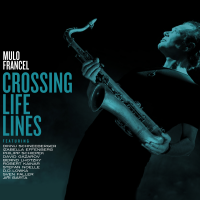Home » Jazz Articles » Album Review » Nate Wooley: Seven Storey Mountain VI
Nate Wooley: Seven Storey Mountain VI
Although Trappist monk Thomas Merton's 1948 autobiography provides both the title and source of inspiration for Wooley's project, he insists that it is not a conventionally religious undertaking. Instead, he seems to see it as an opportunity to pursue elements of self-striving and self-realization (or what he calls "self-as-spirit") that can only be adequately explored through music that seeks some level of creative transcendence. Wooley's liner notes reference Ralph Waldo Emerson as a forerunner of what he ultimately wants to call "a secular practice of self-questioning and evolution." Even so, it is striking how much of Seven Storey Mountain VI relies deeply on a musical vocabulary heavily indebted to the Western spiritual tradition. From the use of a 21-member, all-female choir at the opening and closing of the piece (brilliantly arranged by Wooley and Megan Schubert), to the liberal use of organ at crucial moments in its development, and finally to its original performance at St. Peter's Episcopal Church in Manhattan in November, 2019, the music finds much of its power through its dialogue with a musical legacy that it never leaves entirely behind.
The piece also exudes an overt resilience and defiance, using folk singer Peggy Seeger's 1979 song "Reclaim the Night" as a reference point. With its stirring lament against sexism and gendered violence, its message seems as relevant now as when it was first recorded, and Wooley's ability to weave it into the fabric of the music lends a marked poignancy to the music's cathartic energy.
In its 45-minute, sweeping trajectory, the piece utilizes a steady unfolding of themes and layering of instrumentation. There is an aggregative quality to each performance of Seven Storey Mountain, due not only to recurring personnel such as drummer Chris Corsano and violinist C. Spencer Yeh but also to Wooley's extensive use of tape loops from previous recordings. And the new additions are invaluable also: pedal steel guitarist Susan Alcorn provides rich texture and atmosphere throughout the recording, while electric guitarists Ava Mendoza and Julien Desprez deliver awe-inspiring firepower to the piece's most fervid moments, and keyboardists Isabelle O'Connell and Emily Manzo announce the music's key motifs.
But the music's most memorable aspect is undoubtedly the choir which bookends the piece. From the stark beauty of its opening wordless humming to its closing reiteration of Seeger's lyrics culminating in a fierce chant, "You Can't Scare Me," the collective power of Wooley's "ecstaticism" is directed toward the potential for meaningful social change. The artist's commitment to contribute his royalties to the National Council Against Domestic Violence makes this connection emphatically.
Track Listing
Seven Storey Mountain VI.
Personnel
Nate Wooley
trumpetSamara Lubelski
violinC. Spencer Yeh
violinChris Corsano
drumsBenjamin Hall
drumsRyan Sawyer
drumsSusan Alcorn
guitar, steelJulien Desprez
guitarAva Mendoza
guitarIsabelle O'Connell
keyboardsEmily Manzo
keyboardsYoon Sun Choi
vocalsMellissa Hughes
vocalsMegan Schubert
vocalsAlbum information
Title: Seven Storey Mountain VI | Year Released: 2020 | Record Label: Pyroclastic Records
Tags
PREVIOUS / NEXT
Support All About Jazz
 All About Jazz has been a pillar of jazz since 1995, championing it as an art form and, more importantly, supporting the musicians who make it. Our enduring commitment has made "AAJ" one of the most culturally important websites of its kind, read by hundreds of thousands of fans, musicians and industry figures every month.
All About Jazz has been a pillar of jazz since 1995, championing it as an art form and, more importantly, supporting the musicians who make it. Our enduring commitment has made "AAJ" one of the most culturally important websites of its kind, read by hundreds of thousands of fans, musicians and industry figures every month.




























